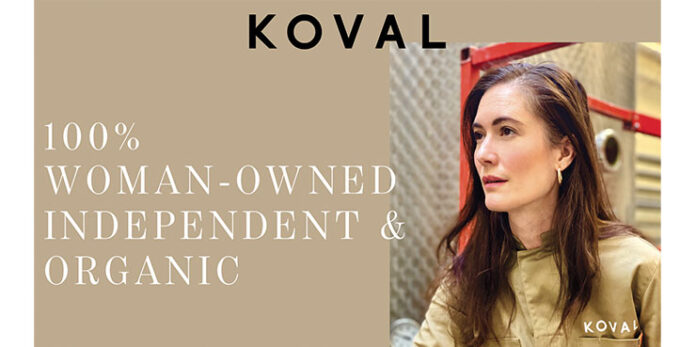In lieu of Women’s History Month, Dr. Sonat Birnecker Hart is a great example of how important women leadership is in the beverage alcohol industry.
After giving up tenure as a full professor, Sonat has become an influential member of the craft distilling community. Not only has she helped educate thousands in the art of starting a distillery through the consulting company she runs with her husband, Robert, Kothe Distilling Technologies, but she has also changed the landscape of distilling in Illinois through her lobbying efforts in 2010 to change the state’s liquor laws.
She is also the owner and president of KOVAL, an organic distillery in Chicago. Here she spearheads product development, distribution and marketing, ultimately turning her family business into an international presence that now has availability in over 55 export markets.
Sonat offers a powerful feminine presence in the beverage alcohol industry and she encourages other entrepreneurs to do the same.

A Desire for Something More
Sonat was pregnant with her first child when she thought about what life would be like to start a family in D.C. Both her and her husband had a desire for something different.
“We wanted to live in a city we loved. D.C. is great, but there’s a lot of commuting and we wanted something more settled,” Sonat says.
So Sonat and her husband moved to Chicago and started KOVAL. It was the first distillery to open in Chicago since the mid-1800s. Their goal with KOVAL was to marry centuries of tradition from Robert’s Austrian distilling heritage with state-of-the-art modern technologies — all with the aim of bringing heightened levels of consistency and creativity to the world of spirits.
“We did a lot of research and felt this was something we were able to do,” Sonat notes. “I also had to get the laws changed in Illinois to make it possible to have a craft distillery, since that distinction didn’t exist. We couldn’t do tours, tastings, retail — none of that was possible. So I got the laws changed to make that possible.”
Growing the KOVAL Business and Family
Even though Sonat spent over a decade as a full time professor in both the U.S. and Germany, she didn’t know much about the craft distillery experience. Robert taught her everything she needed to know, and now they both run the distillery as a team.
“In the beginning, I managed all of our licensing, marketing, sales and had the laws changed, but I was also still nursing and pregnant with my second child. It was really a collaborative process in the beginning where it was just us two,” Sonat explains. “As we’ve grown, we’ve taken on different tasks. I’m on the sales and marketing side, while he’s on the production side of the business.”
Doing all of this while having two small children can be very time consuming, but Sonat made and continues to make the best of it.
“For me, it’s all about family,” she says. “Luckily I work with my family, so we spend time together. We also homeschool our children — they have their own office set up where they’re studying and learning all day. I don’t have a lot of time for other things, since this is all encompassing, but at least my family is together.”
Currently, KOVAL spirits are available throughout the U.S., most of Canada and Europe, Japan, Australia, New Zealand and South Africa. And they’re always looking to increase their distribution.
“We’re always looking for other partners,” says Sonat. “In addition, we’re always trying to go deeper into various markets that are performing well. We just added a third still, so we’re always growing.”
The KOVAL Method
KOVAL Distillery crafts a line of whiskey, gin and specialty spirits using unique organic grains and signature “heart cut” techniques with quality distillate. Heart cut means they only use the best part of what comes off the still, according to Sonat. She calls it: “the filet of the distillate.”
“With this, we break from the American tradition of making whiskey, which uses all of the hearts and the tails,” she explains. “The tails are lower in alcohol, have different chemical compounds and taste and smell like wet dog. So we wanted to have a different style of only using the heart cut.”
While this technique can be quite expensive, Sonat says that it gives the whiskey much more flavor. Perhaps this is why KOVAL’s whiskeys have won a variety of awards, including Best Whiskey from the USA, Silver Medal at the 2015 Spirits Prestige International (SIP) Awards and Gold Medal at the Women’s Wine & Spirit Awards 2020.
Sonat also says that they use enzymatic fermentation to make their whiskey, which comes from the Japanese tradition of fermenting sake. “It’s been commonly used in Europe for brandy production, but we apply it to grain, as well,” she notes.
Passing Down the Craft Distilling Knowledge
Through their consulting company, Kothe Distilling Technologies, Sonat says they’ve educated almost 4,000 people who have come to Chicago to learn about craft distilling. They’ve also helped set up over 200 distilleries for people in Europe, South America, Japan, Scandinavia and more areas.
“We have had workshops where people come and learn our techniques,” says Sonat. “We’ve also served as faculty for The Siebel Institute of Technology, which is a brewing university in Chicago.”
Sonat hopes to continue to provide the beverage alcohol industry with insight and resources for those engaged in craft distilling on a smaller scale.
“We also provide the craft industry with high technology,” she explains. “Robert has done a lot of programming and has worked with colleagues in Germany to automate systems for larger distilleries so nobody needs to fly blind. Everyone knows exactly what’s going on through every step of the process in a really high tech manner. This can even be done for smaller distilleries, too.”




